If you have ever used Alexa or ChatGPT, pat yourself- you’ve used conversational AI chatbots. But, why are they so popular, and why businesses should use them?
Well, that’s exactly what we will be discussing in this article. With the conversational AI chatbot market anticipated to hit a 23.6% growth rate, these AI-powered chatbots are emerging as a new method of communication.
What is a Conversational AI Chabot?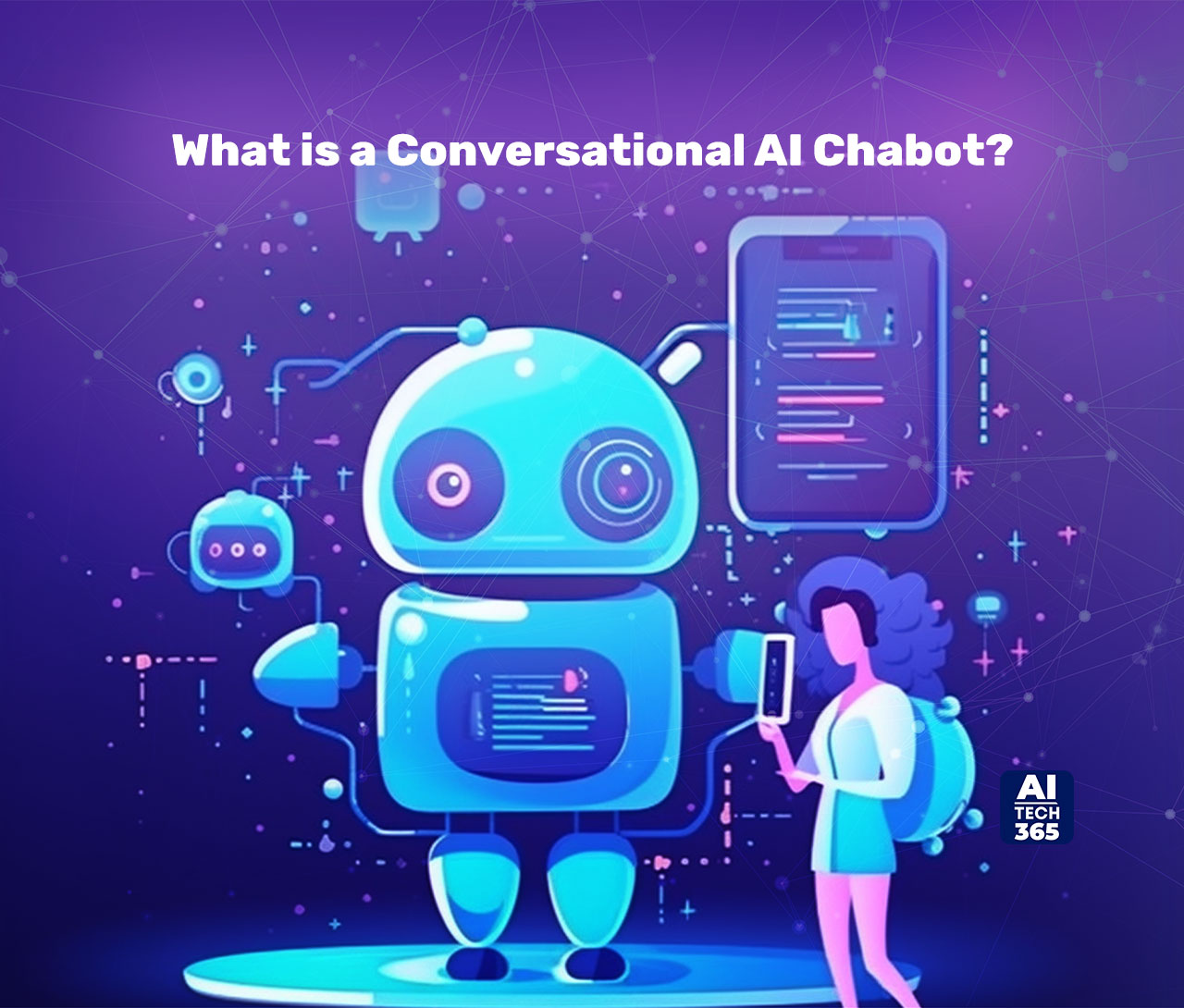
Conversational AI refers to the integration of artificial intelligence, natural language processing (NLP), and machine learning (ML) technology. This integration aims to empower chatbots by enhancing their intelligence to facilitate more human-like interactions. Conversational AI experts keep learning to recognize patterns and give suggestions based on user input and conversations they gather over time.
Studies revealed that using conversational AI chatbots increased 94% agent productivity and resolved 92% of customer issues faster. Furthermore, 34% of customers feel comfortable talking to AI chatbot customer service. Conversational interfaces powered by chatbot development are revolutionizing the way users interact with technology, enabling natural and engaging dialogues. This means improved productivity, increased sales, and a great customer experience.
What is the Difference Between Chatbot and Conversational AI?
Chatbots and conversational AI are two closely related concepts serving similar purposes. Chatbots are automated message systems that interact with users through voice-based and text-based communication, while conversational AI is a technology that simulates human conversations in a more advanced way.
More than 91% of chatbot conversations are successfully resolved from beginning to end. This is why businesses are increasingly adopting conversational AI to offer human-like customer interactions. With new technologies coming up, it’s only time until chatbot integration gives humans a positive edge.
Why is AI Chatbot Increasingly Used By Businesses/Enterprises?
Businesses are using AI chatbots for several reasons, including:
- Enhancing customer service is a key benefit. Chatbots offer round-the-clock support, ensuring customers receive timely assistance regardless of the hour. They swiftly address simple questions, provide immediate responses, and help customers find information effortlessly, boosting satisfaction and overall service experience.
- Efficiency and productivity soar when chatbots automate repetitive tasks. Simultaneously handling multiple inquiries lightens the load on human agents, enabling them to focus on complex issues. This strengthens operations and amplifies the output.
- The cost savings are substantial with chatbot implementation. By 2022, Juniper Research approximated that chatbots had contributed to business savings exceeding $8 billion annually. By addressing high inquiry volumes without additional staffing, businesses can significantly reduce operational costs.
- Sales and revenue can surge with chatbot integration. Engaging customers, offering personalized recommendations, and guiding sales processes, chatbots have boosted sales by an average of 67% for some companies. They also gather valuable customer data, enabling businesses to analyze trends and refine marketing strategies.
- AI chatbots understand natural language and context. They offer personalized interactions, learning from user behavior. Over time, responses adapt for a tailored experience, boosting satisfaction and loyalty.
- Businesses move operations online through digital transformation. Chatbots are essential tools for assisting customers with inquiries, product recommendations, and process automation. They connect companies with customers across digital channels, providing seamless experiences.
7 Best Conversational AI Chatbots for 2024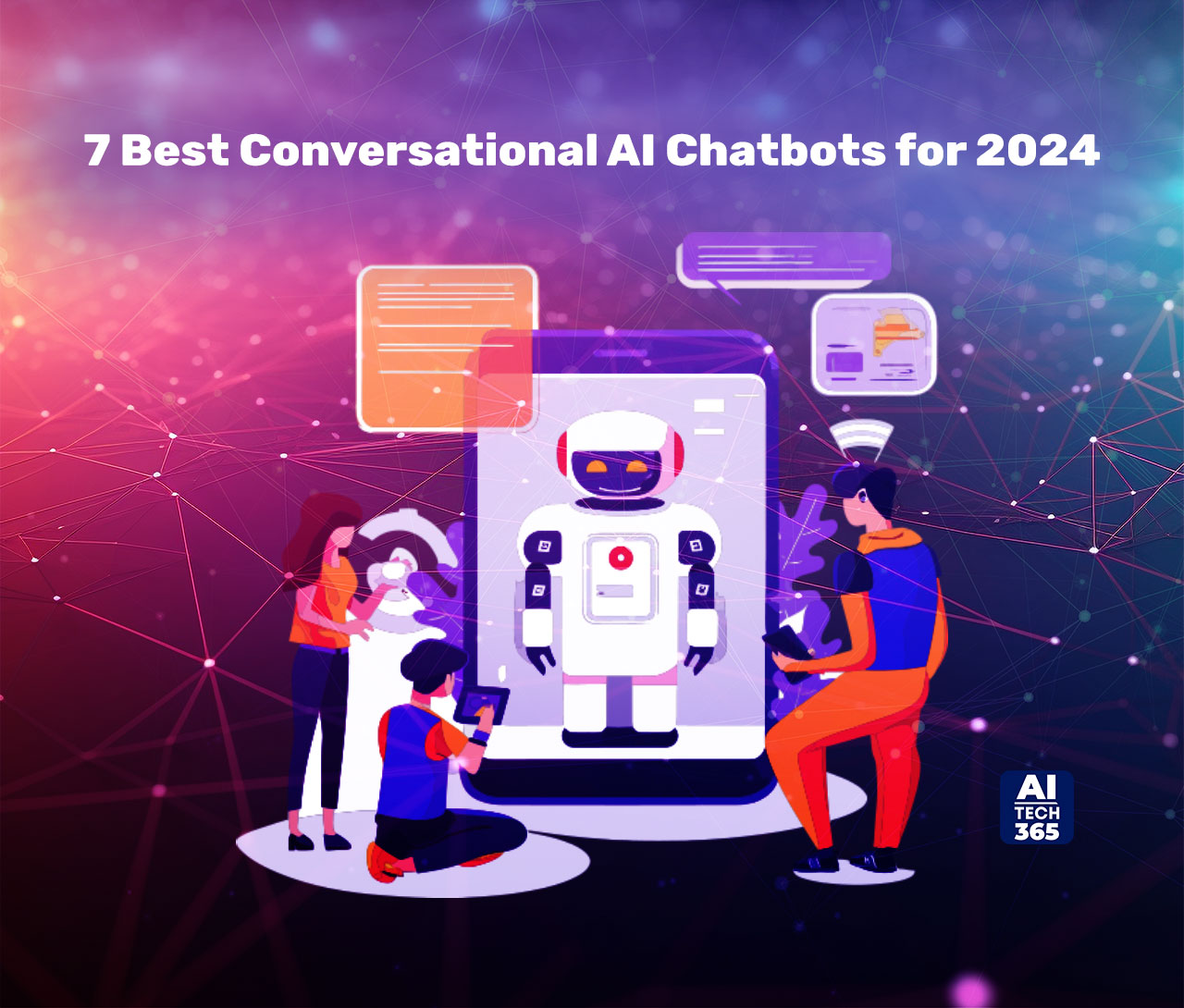
Gemini (by Google)
This AI chatbot excels at understanding and responding to complex queries in a comprehensive and informative way. Integrates seamlessly with Google applications and services, making it a powerful tool for research and information gathering.
Features:
- Gemini fits perfectly with Google Apps, letting you use your Google accounts inside Gemini’s chat, leading to a seamless experience.
- Gemini has powerful NLP that answers all tricky questions. Responses seem natural and conversational. This advanced technology makes chatting feel realistic.
- Gemini keeps content from past talks and tweaks responses based on your history. Thus, tailoring chats enhances the user experience.
Pricing: Free version is available.
ChatGPT (by OpenAI)
Known for its ability to generate human-quality text formats, ChatGPT can create different creative text content formats like poems, scripts, musical pieces, and even emails. It’s a versatile tool for writers and anyone who needs help crafting specific content.
Features:
- ChatGPT automates routine tasks efficiently, allowing workers to concentrate on strategic responsibilities. This boosts operational efficiency within companies.
- ChatGPT’s capabilities are diverse; it generates text, answers queries, writes code, drafts emails, and converses on various subjects. This versatility benefits enterprises.
- ChatGPT integrates seamlessly with apps and systems via platforms like Zapier. Businesses can thus incorporate AI capabilities into critical workflows, enhancing productivity.
Amazon Alexa
A household name, Alexa is a virtual assistant that can control smart home devices, play music, answer questions, and even set reminders. Alexa is known for its contextual understanding, allowing for more natural and interactive conversations.
- Alexa uses voice commands to work without complex menus or learning curves. Users can simply speak to Alexa to complete tasks, ask questions, or get information, acting as an easy conversational AI chatbot.
- Alexa works in real life, helping beyond just browsing online. It controls smart home devices, plays music, sends reminders, gives weather updates, and does various other everyday tasks.
- Amazon continuously enhances Alexa’s communication abilities using AI technologies like generative AI such as ChatGPT. This improves the naturalness and efficacy of talking with Alexa, keeping it at the forefront of conversational AI innovation.
IBM Watson Assistant
Designed to elevate customer and employee experiences, Watson Assistant is a powerful tool for businesses. It understands natural language and can generate responses that are tailored to specific user needs.
Features:
- Intuitive User Interface: IBM Watson Assistant boasts a user-friendly interface, enabling non-technical users to create and manage advanced conversational flows effortlessly. With drag-and-drop functionality and industry-specific templates, experts can deploy customized AI chatbots quickly.
- Seamless Integration and Automation: Watson Assistant seamlessly integrates with various tools and systems, enabling businesses to offer automated self-service support across multiple channels. Integration with service desks, search tools, and analytics platforms enhances the overall customer experience and streamlines support processes.
- Personalized and Accurate Responses: Watson Assistant utilizes large language models (LLMs) to provide fast, accurate, and personalized responses to customer queries. Drawing from the company’s knowledge base, it generates conversational answers grounded in relevant information, ensuring a positive customer experience.
HubSpot Chatbot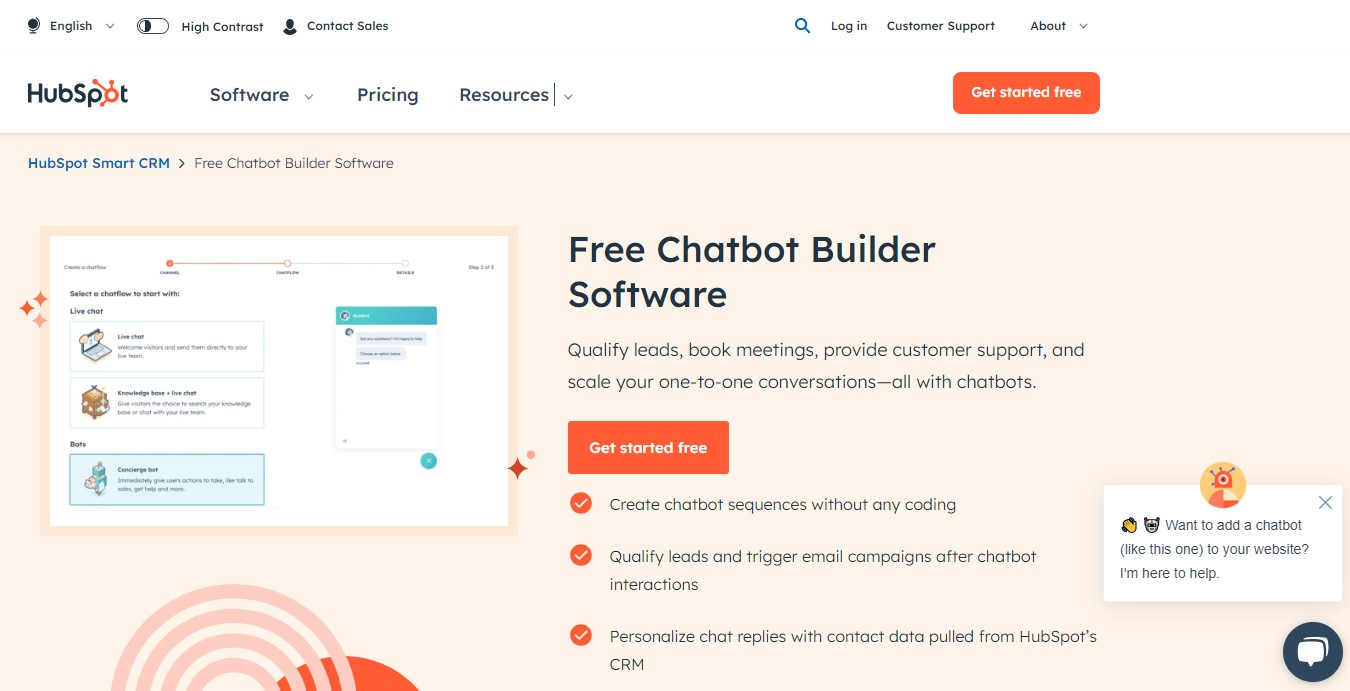
HubSpot Chatbot simplifies lead qualification and customer support processes with its intuitive design and automation features. It streamlines communication channels, enabling businesses to deliver timely and personalized responses.
- ai integrates with HubSpot CRM seamlessly. You can use AI-powered conversations in CRM workflows. It gives real-time insights, company research, keyword rankings, and actionable information. This helps sales, marketing, and service teams make data-driven decisions.
- HubSpot Chatbot automates repetitive tasks. It collects visitor information and syncs it to the CRM. The chatbot handles custom questions, creates support tickets, adds users to lists and workflows, and more. Automating these processes allows for personalized customer interactions. It enhances the overall customer experience.
ManyChat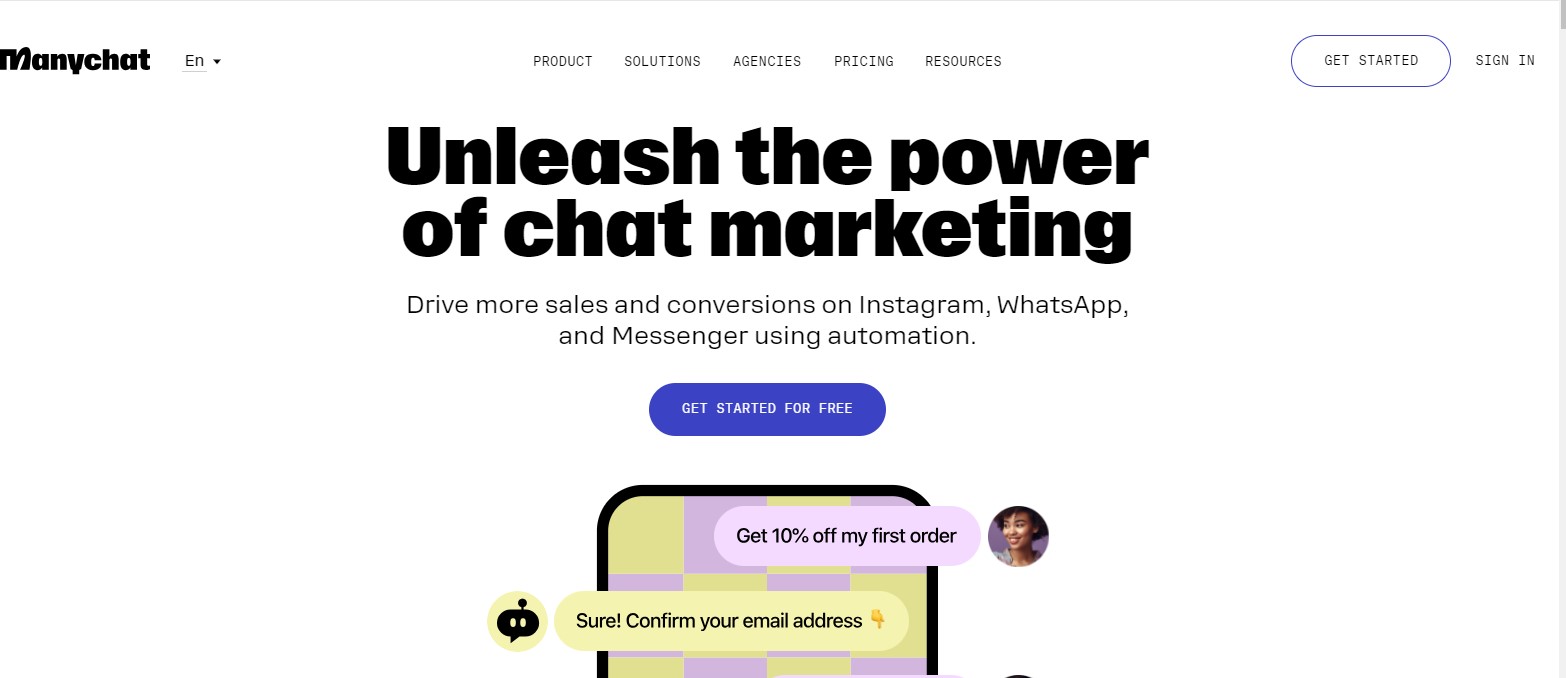
ManyChat is a tool made just for businesses looking to create chatbots for Facebook Messenger. These chatbots can do all sorts of helpful things, like:
- Helping with customer service: They can answer common questions, track orders, or give simple troubleshooting tips.
- Assisting with marketing and sales: They’re great for sorting leads, gathering customer details, and even leading users through the sales process.
Zendesk Chatbot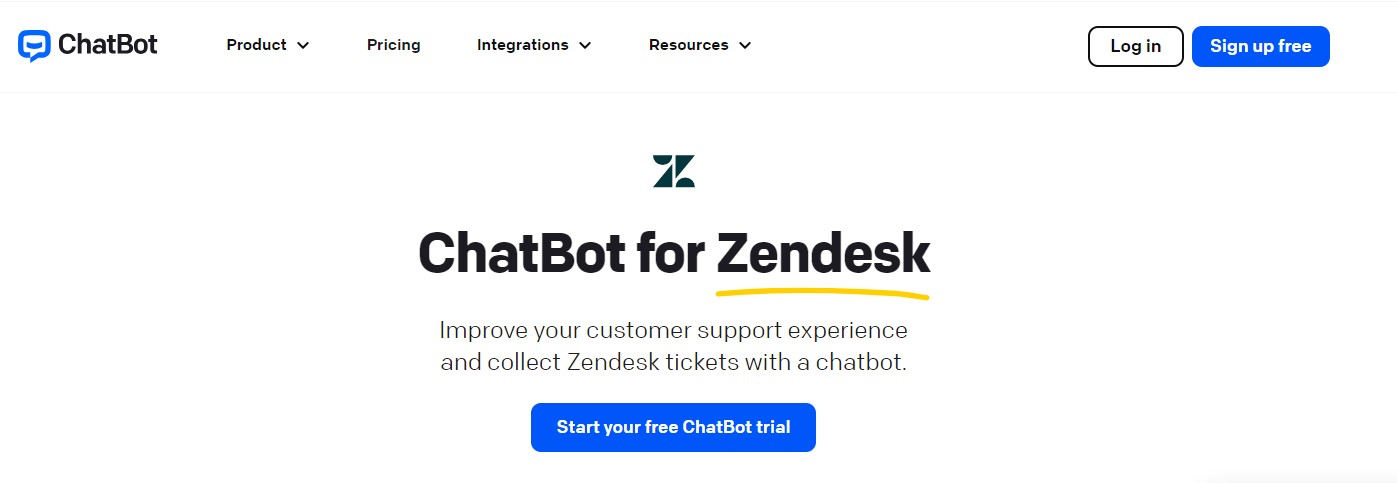
Zendesk Chatbot integrates seamlessly with Zendesk’s customer support suite, enabling businesses to deliver personalized support experiences. Its AI-driven automation capabilities streamline ticket management and resolution processes.
- Visual Builder makes it easy to design conversation flows. You can drag and drop to create decision trees based on user input. This allows the chatbot to respond and ask follow-up questions naturally.
- Responses can be dynamic and personalized using user information and chat history. So it’s tailored to each person’s needs.
- Zendesk has some AI features, but they’re limited to the standard plans. You may need integrations or upgrades for advanced AI. But the AI can still help understand user intent and give relevant responses.
End Note
Chatbots with conversational AI abilities change how companies speak to customers. These chatbots grasp human language well. They use smart codes to give custom support that works smoothly. Conversational AI chatbots automate routine jobs, mimic human-like correct responses., and connect to various systems to provide better customer service.


